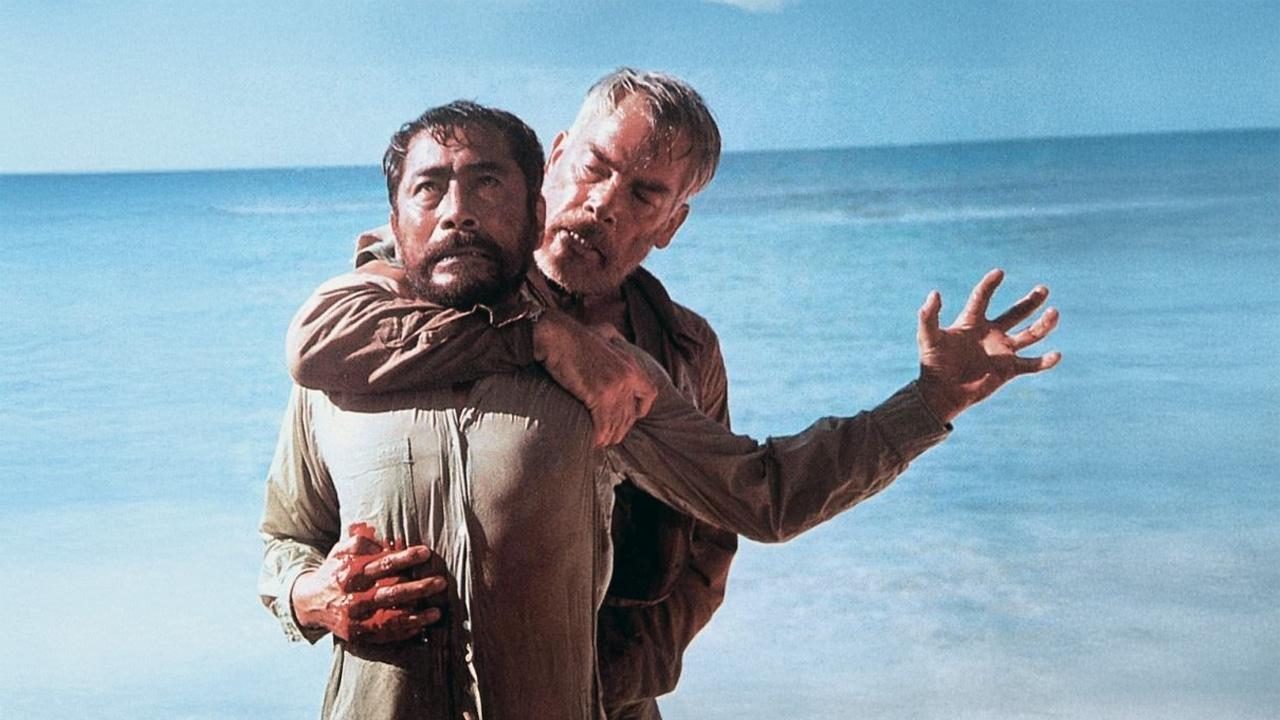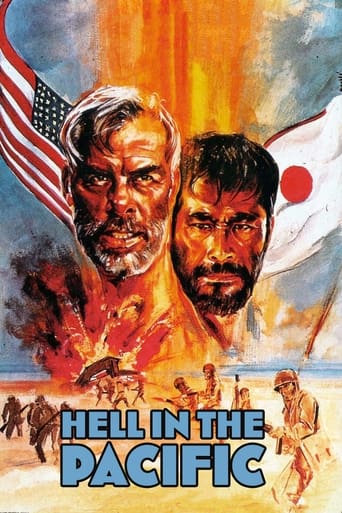Beystiman
It's fun, it's light, [but] it has a hard time when its tries to get heavy.
AnhartLinkin
This story has more twists and turns than a second-rate soap opera.
Bergorks
If you like to be scared, if you like to laugh, and if you like to learn a thing or two at the movies, this absolutely cannot be missed.
Beulah Bram
A film of deceptively outspoken contemporary relevance, this is cinema at its most alert, alarming and alive.
rhodesiajim
. ...In 1969 I was a Marine infantryman. The Corps sent me to RVN free of charge. I did, however, get to spend time in Hong Kong. While others may have spent all their time carousing, I watched as many films as possible while there. ...My Chinese date took me to see a film in Mandarin with English and Cantonese subtitles. We also saw McKenna's Gold with Cantonese subtitles... and most relevant... Hell in the Pacific with Cantonese and English subtitles. In short, I got to understand every comment that Torshiro Mifune uttered. (Spoiler alert...)...Not that it added a great deal to the film. When Mifune's character gets urinated on, he charges in the ocean to wash himself shouting, "Dirty, dirty!" When he gets drunk near the end he expresses his melancholia by singing a dirge, "If I die on the land, I'll be a land corpse, if I die on the sea, I'll be a sea corpse..." Not the best frame of mind to be interrupted by Marvin's character....In short, you didn't miss a lot by being in the same boat as Marvin's character and understanding so little. But the Chinese didn't get it and just slapped on the subtitles... Rhodesia Jim
capone666
Hell in the PacificThe worst part about conducting a war on a South Pacific beach is trying not to step on any of the sunbathers.Fortunately, the warring factions in this drama are the only people on the island.Amid the dogfights of WWII, an American pilot (Lee Marvin) is shot down over the Pacific.Deserted on an islet, the pilot discovers he's not alone - a Japanese Navy Officer (Toshiro Mifune) is also marooned there.Instinctively, the two immediately try to kill one another with their limited weaponry.Overtime, however, the pair must learn to cooperate in order to survive.But is there enough room on the atoll for the Japanese castaway's honour and the Yankee castaway's bullheadedness?With only two stars, minimal dialogue and an exotic setting, Hell in the Pacific breaks war down to its basics, and dissects.Furthermore, this island coupling led to the creation of Japanese-American fusion cuisine.Green Lightvidiotreviews.blogspot.com
secondtake
Hell in the Pacific (1968)A great concept--two men are lost together on an island in the Pacific. The war is over, but prejudices remain, and one man is Japanese, one American. They don't share a language, so there is basically no dialog. There is only survival.How do you make a feature length movie about this without stretching the idea thin, without boring the viewer, without resorting to clichés of makeshift boats and coconut to eat? You don't. The movie is ambitious over very little, and if it seems impressive in some isolated, focused way, it is still a slow go.And you kind of know what the progression of events is going to be, as common human needs rise above nationalist myopia. What keeps it afloat at all is the odd combination of the quirky boorish stereotype American thug, Lee Marvin, who is not his best in this situation (but who has his own following--I like him in his crime films a lot) and the most famous Japanese actor of the period, the Kurosawa standard bearer Toshiro Mifune (who is an archetype of the vigorous, smart Japanese male).I have to admit I didn't really like the most recent parallel production, "Castaway," at least not the island parts (which everyone I know loved). In all these cases you depend on the acting, the actors themselves, to make it special. And for some that might be enough. It's a unique movie, for sure, a kind of old Hollywood hanger-on in the new Hollywood era. John Boorman had just finished the remarkable "Point Blank" with Marvin, and would soon work on "Deliverance," and all three have a masculine quality of rising about a hostile world and making it on your own terms.Finally, if you do get through it all, the last five minutes is important--clumsy and improbable and sensationalist after all that preceded, but important. It tries at last to talk about the difficulty of really understanding someone else, personally and culturally, and about the madness and indifference of war. It's 1968, after all.
Spikeopath
Hell in the Pacific is directed by John Boorman and stars Lee Marvin and Toshirō Mifune. It's written by Reuben Bercovitch, Alexander Jacobs & Eric Bercovici and the music is by Lalo Schifrin. During World War II, two men, one American and one Japanese, are marooned on an uninhabited Pacific island. In order for them to survive they must find away to co-exist and maybe, just maybe, forget the War and find a way off the island.Intriguing premise and two watchable stars not withstanding, Hell In The Pacific is not a particularly great film. Decent? Yes! But the novelty value of a two actor piece, with sparse dialogue, soon wears thin. The central idea of two racially different characters forced to come together, is hardly a new one. It's been done considerably better before this film with the likes of The Defiant Ones in 1958. But Boorman's movie does not lack for invention or trying to veer from the norm. Neither character speaks the other's language, so with no dubbing or subtitles, the viewers are forced to be part of the unique situation; sharing in the frustrations of two people unable to communicate verbally. That both Mifune & Marvin are fine actors physically and with their faces, also benefits the piece and the viewers. With both men ex-servicemen of their respective countries also a notable plus point.The film was entirely shot in the Rock Islands of Palau in the north Pacific Ocean, near the Philippines in the Philippine Sea. Visually it is a treat with the blues and greens offering up a beauty that battles the harsh like atmosphere for supremacy. It's impact being that of throwing up a heaven and hell comparison. Yet this pleasing aspect of the film is almost ruined by Schifrin's score. In a piece awash with loneliness, suspicion and borderline hatred, we really don't need evocative and perky, we want threatening and sedate. Which brings us to Boorman's direction, which is choppy and unsure what tones work best within the story. It's no surprise to find that the producers wanted to fire him off the project; his bacon saved by Mifune's insistence that Boorman stayed on. There is also some consternation with the ending(s) of the film, where both available endings have actually caused disapproval in equal measure. In truth neither ending fully rewards the viewer for having spent over 100 minutes with these two men. But for the record I personally like the "abrupt" one better.Its intentions are honourable, and for trying something different it deserves a pat on the back. But too many itches exist within; and thus the film is scratchy and never able to achieve allegorical greatness. 6/10

